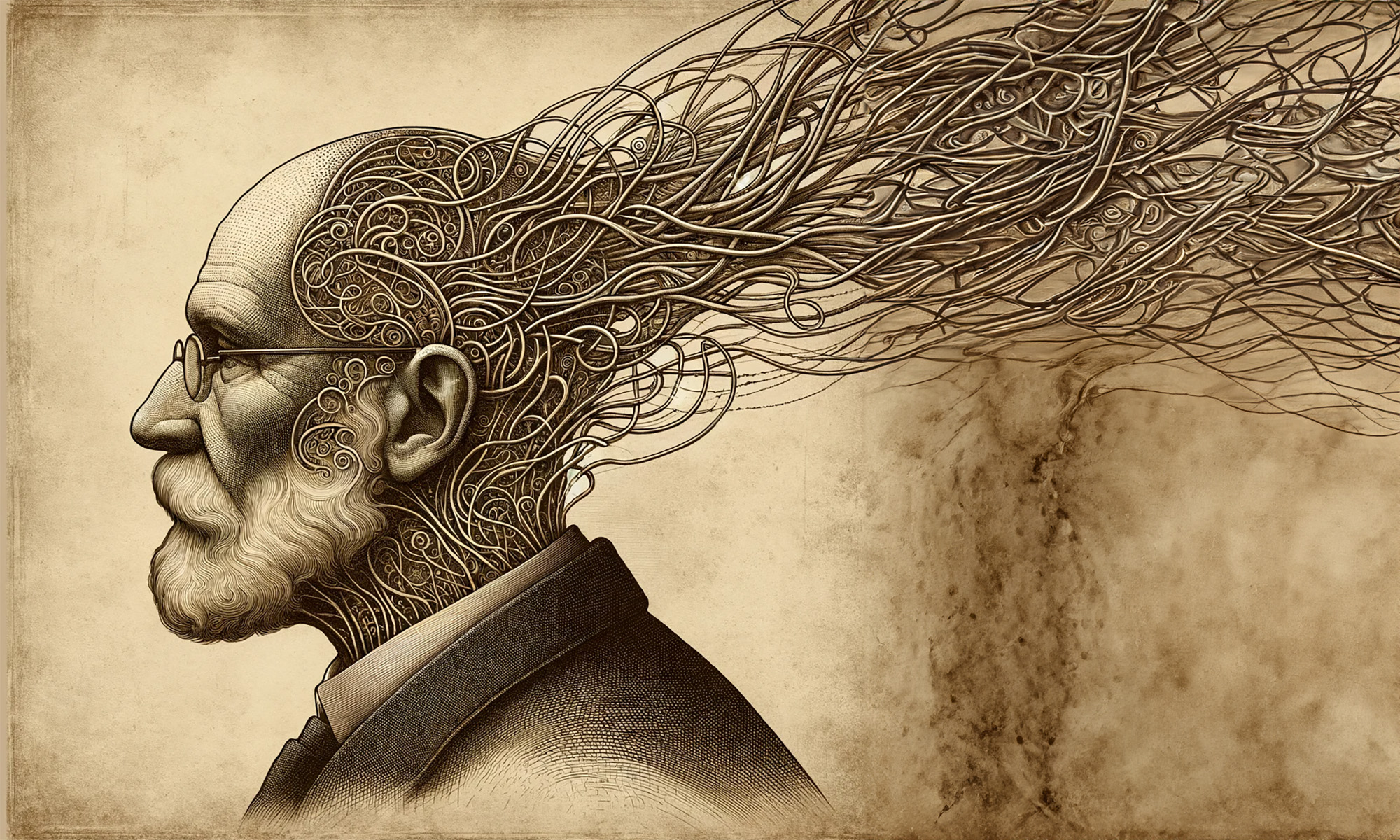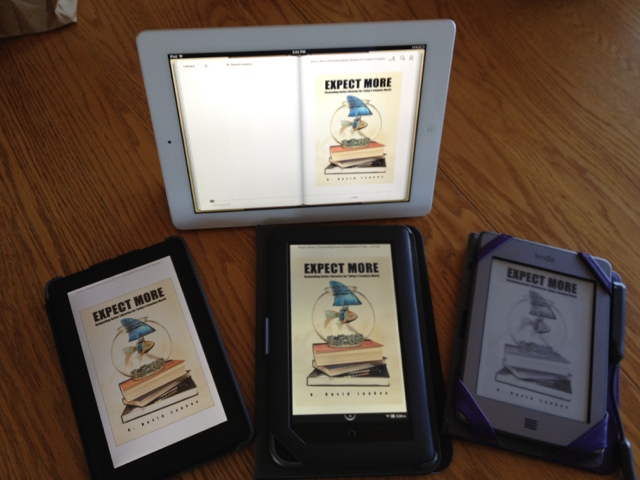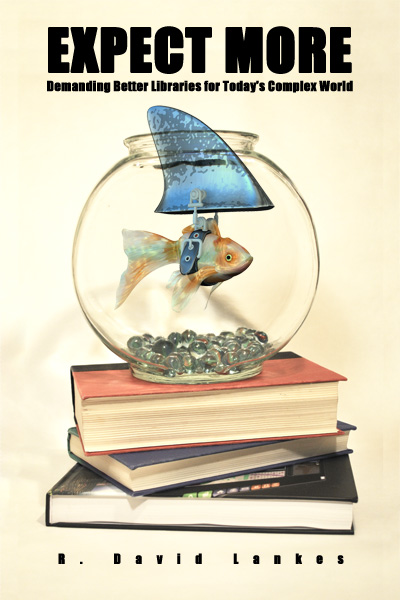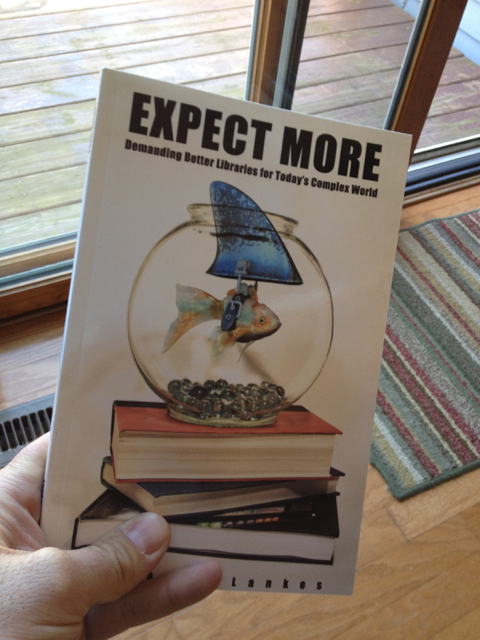Here is a sample chapter (Chapter 1) and the Table of Contents of Expect More. You can see a slightly larger sample if you go to the SmashWords site and use the HTML viewer to see the sample.
Table of Contents
Acknowledgements iv
Introduction 1
A Special Note for Librarians 2
1. The Arab Spring: Expect the Exceptional 3
2. The Argument for Better Libraries: Expect Impact 9
Collective Buying Agent 10
Economic Stimulus 13
Center of Learning 16
Safety Net 17
Steward of Cultural Heritage 19
Cradle of Democracy 20
Symbol of Community Aspirations 24
3. The Mission of Libraries: Expect More Than Books 27
I Love Reading…No Really 33
Mission to Nowhere? 34
A Mission Based on Higher Expectations 39
4. Facilitating Knowledge Creation: Expect to Create 41
Library as Facilitator 42
What is Knowledge? 43
Expanding the Definition of Facilitation 47
Teacher, Librarian, Tinker, Spy 58
5. Improve Society: Expect Grander 59
Expecting More Than Pie and Prostitutes 61
Of the Community 62
Walled Gardens 66
Grand Challenges 67
Is My Library that Grand? 71
6. Communities: Expect a Platform 75
Library as Platform 76
Libraries as Place 83
7. Librarians: Expect Brilliance 87
Librarian by Hire 87
Librarian by Degree 88
Librarian by Spirit 92
Salzburg and a Few of My Favorite Things 93
The Facilitators 96
Adding Up a Librarian 98
8. Action Plan: Expect More 101
Action Plan for Great Libraries 101
Action Plan for Bad Libraries 103
Action Plan for Good Libraries 111
About the Author 113
Index—Expect More 115
Sample Chapter: The Arab Spring: Expect the Exceptional
The Arab Spring had come to Egypt. In early 2011, on the heels of a successful revolution in Tunisia, Egyptians took to the streets to demand reforms from a government regime that had been in power for nearly 30 years. While much of the media fixated on protestors who occupied Tahrir Square in the Egyptian capital of Cairo, many protests started in the port city of Alexandria. In Alexandria, as in Cairo, people from across generations and the socio-economic scale rioted to demand liberty, justice, and social equity. In an attempt to restore the constitution, what was seen primarily as a peaceful uprising lead to the deaths of at least 846 people, and an additional 6,000 injured[1] across Egypt. On January 28 at 6 pm, after the prisons had opened, releasing murderers and rapists onto the street, all security withdrew from the streets of Alexandria. Roving gangs of looters took to the streets to take advantage of the chaos.
In Egypt’s port city, the violence and looting devastated government buildings. Where offices once stood, only burned-out rubble remained. Protestors went from building to building pulling down the symbols of corrupt power. Some looters and protestors then began to eye the Library of Alexandria.
President Mubarak, the focus of the uprising, had opened the modern library in 2002 at a cost of about $220 million. According to the library’s website, Mubarak built it to “recapture the spirit of openness and scholarship of the original,”[2] the famous ancient Library of Alexandria—one of the wonders of the ancient world.
As it became apparent that the library might be in danger, protestors joined hands and surrounded the Library of Alexandria. Their goal was not to attack it or raid it, but to protect it. Throughout the protests and looting, the protestors—women, men and children—stood firm and protected the library. In essence, they were retaking the library for the people. After the uprising had subsided, when President Mubarak had stepped down and the protestors were celebrating their victory around the country, not a window of the library had been broken, not a rock thrown against its walls. Why, in the midst of tearing down the regime, did the people of the nation protect the library?
Why?
Why are stories like this, while maybe not quite so dramatic, repeated across the U.K. and the United States? As cities faced with a devastating financial crisis sought to close library branches, citizens rallied. Protestors disrupted town halls and city council meetings. Citizens picketed, and in Philadelphia, the City Council went so far as to sue the Mayor over the closing of libraries.
In Kenya, the government is building public libraries throughout the country, in rural and urban areas alike. Where the communities are too remote, they have built book carts—5,000 books in a wooden cart pulled by donkeys. In the even more remote northern sections of the country, they strap carts and tents to camels. Inside the villages, the carts are opened and the tents erected to allow parents and children an opportunity to learn. In these villages, camels provide transportation, labor, milk, and meat; even their dung is dried to power stoves. Now this essential animal is seen as providing another critical service: bringing knowledge to the people.
In the countryside along the coast of Colombia, Luis Soriano urges along his two donkeys, Alfa and Beto. On the backs of the donkeys are crates of books. Luis, a primary school teacher by trade, carries a sign reading “Biblioburro.” He is bringing books to small villages and spreading literacy throughout the countryside to children who have seen too much violence and conflict for their years. He began with 70 books. Through donations he has grown the collection to over 4,800 volumes, far past the capacity of his four-legged friends. He now houses the collection in a half-built room that has become an official satellite to the Santa Maria Community Library, some 180 miles away[3].
We find libraries in the finest castles of Europe and in the midst of the Occupy Wall Street populist protests in the States. Libraries are embraced by the elite and the commoner alike. We find librarianship in jungles and deserts, in schools, corporations, and in government agencies.
When we try to discover why, we find that there is power in libraries and steel in librarians. It goes deeper than tradition, buildings, and books. The reason for the protests and protectiveness over libraries is not found in collections of materials or columns and architecture. To find the answer to this riddle, one must look past the buildings and the books to the professionals who, throughout history, have served humanity’s highest calling—to learn.
Libraries and librarians stood at the center of a growing Egyptian empire in the third century BC and the expansion of mathematics in Arabia in the fourteenth century.[4] Libraries helped bring Europe out of the Dark Ages and into the Renaissance, and helped democracy thrive in a post-colonial United States of America. Now, with the advent of the Internet and a new digital age, librarians are once again pointing the way towards a better society, founded in knowledge and giving respect to diverse views. This book is about what libraries and librarians can tell us about creating a brighter future and what kind of libraries and librarians we are going to need to make that future a reality.
Today’s librarians are using the lessons learned over that nearly 3,000-year history to forge a new librarianship based not on books and artifacts but on knowledge and community. They are taking advantage of the technological leaps of today to empower our communities to improve. The librarians of today are radical positive change agents in our classrooms, boardrooms, and legislative chambers. They built the web before we called it the web. They were crowdsourcing knowledge and searching through mountains of information before Google, before Facebook, and even before indoor plumbing. Today’s new librarians are not threatened or made obsolete by the Net. They are pushing the Net forward and shaping the world around you—often without your notice.
The field of librarianship represents an investment of nearly $7 billion in the U.S. and $31 billion worldwide.[5] In an age when traditional institutions are declining, library usage has grown steadily over the past twenty years. Did you know that there are more public libraries than McDonald’s restaurants in the U.S. and that Americans go to libraries nearly three times more often than they go to the movies?[6] By understanding librarians and libraries we can understand how to build credibility and trust in a community overwhelmed with change and choices. We can discover how to create an environment to disagree and maintain a civil discourse. Ultimately, by understanding new librarianship, we can even understand something as grand as the role of a citizen in society.
Perhaps the biggest “why” question you can ask, and the one at the center of this book, is why do so many people see librarianship as antiquated, conservative, and less-than-inspiring? Why is it that while folks love the idea of libraries and librarians, they are quick to limit them to books or children, or simply think of them as historical holdovers? The answer is not that these people are wrong, but that they need to expect more. Too many libraries are about books. Too many librarians are reliving history and are stuck in a sort of professional conservatism that favors what they do over why they do it. Too many librarians see their collections, not the community, as their jobs. Too many libraries are seeking to survive instead of innovate, and promote the love of reading over the empowerment of the populations they serve. I am not claiming that these librarians are the majority, but they are too numerous and their communities (you) expect too little of them.
This book is written not for those librarians but for the people who either support or oversee libraries. This includes college provosts, students, parents, board members, volunteers, and, well, just about everyone who has ever gone to school or pays local taxes. You need to know what libraries are capable of, and you need to raise the bar on your expectations.
Throughout this book you are going to find examples of amazing libraries and librarians. Today, many in the field would call them exceptional, just as you might call the librarians in Egypt and Kenya exceptional. This is the root of the problem. These libraries may have been in exceptional circumstances, but their dedication to service and their connection to their communities should not be seen as exceptions to the norm. They should be the norm to which all libraries aspire.
In this book, you are going to read about a public library that has created a Fab Lab—a space where the community can work with 3D printers and make new inventions. You are going to read about a school library where the librarian is too busy helping teachers raise their performance to shelve books. You are going to read about librarians creating new companies in rural Illinois and transforming lives in Dallas. These are brilliant libraries and librarians, but if you see them as exceptional—as above and beyond the norm—you expect too little of your library.
Here is the key to a successful library: you. In a city or a Fortune 500 company, the library must shape itself around you and the goals of your community. If your community strives for greatness, the library should be great. If you are concerned about the future, or the economy, or the future of democratic discourse in this country, your library should be concerned as well. If you make these expectations known, if you arm yourself with what is possible and not what is, then the library and librarians can meet those expectations and goals. Of course, this is a two-way street. Great libraries expect a lot of their communities as well. Yes, great libraries require financial support, but even more than that they require open communication about your needs, your challenges, and your dreams.
This book will not be a love letter to libraries. I am not trying to turn you into a librarian. Instead, this is meant to begin an honest and realistic dialog about the place of libraries and librarians in your communities. Join me now as we explore the true potential of libraries and librarians.
[1] http://en.wikipedia.org/wiki/2011_Egyptian_revolution—Yes, a librarian and university professor just cited Wikipedia. I do it a lot throughout the book. There is nothing inherently wrong or non-credible in Wikipedia. In fact, it is more transparent in the construction of information than most published encyclopedias. I cite it because it is easy for the reader to get to, it is a great jumping-off point through references to other works, and I have verified the information in other sources…like we all should do.
[2] http://www.bibalex.org/aboutus/overview_en.aspx (accessed May 19, 2012)
[3] see http://en.wikipedia.org/wiki/Biblioburro (accessed May 8, 2012), and http://www.nytimes.com/2008/10/20/world/americas/20burro.html (accessed May 8, 2012)
[4] http://www-history.mcs.st-and.ac.uk/HistTopics/Arabic_mathematics.html (accessed May 8, 2012)
[5] http://www.oclc.org/us/en/reports/2003libsstackup.htm (accessed May 19, 2012)
[6] American Library Association (2010). Quotable facts about America’s libraries. Retrieved from http://www.ala.org/ala/aboutala/offices/ola/quotablefacts/QF.3.8.2010.pdf

 It’s a back to school sale on Expect More: Demanding Better Libraries For Today’s Complex World ebooks. All formats now $9.99.
It’s a back to school sale on Expect More: Demanding Better Libraries For Today’s Complex World ebooks. All formats now $9.99.
